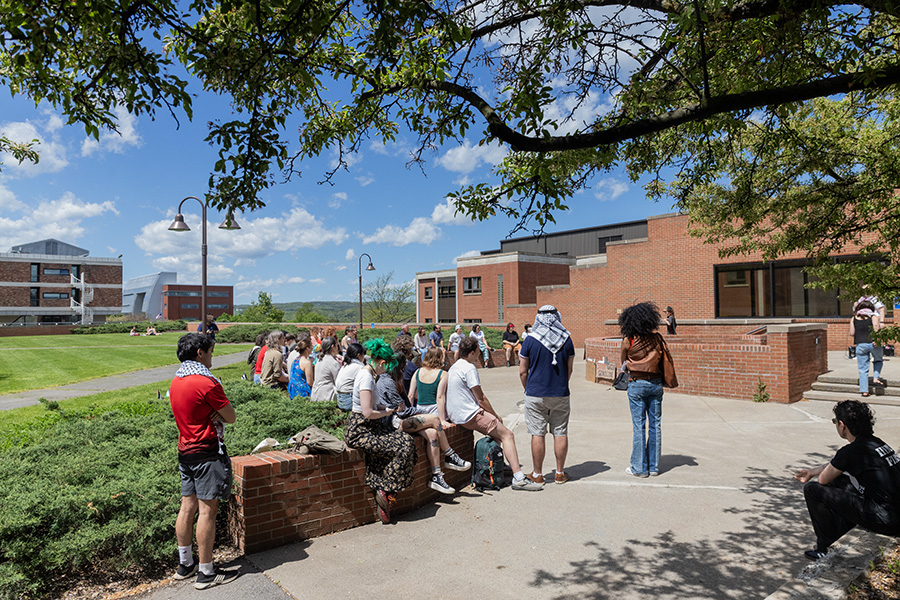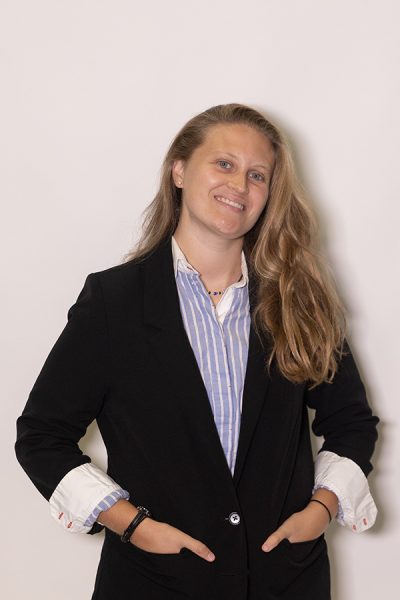Ithaca College Students for Justice in Palestine (ICSJP) hosted a listen-in, their final event of Spring 2024. The event was held at the Free Speech Rock on May 8, where students spoke about their experiences on campus, past protests and the history of the Israel-Hamas war.
Sophomore Quincey Fireside, president of Ithaca College Students for Palestine (ICSFP) reiterated the demands the group made to President La Jerne Cornish that were rejected. The group also distributed QR codes on sheets of paper that linked to a petition for the college to disclose where the college invests its money and to divest from Israel. As of May 10, the petition had 760 signatures.
The group hand delivered a letter to Cornish on May 10 based on the petition, outlining their updated demands: “Disclosure of financial ties with Israel or any companies who align themselves with the Israeli apartheid state; A letter disseminated to the student body in which President Cornish not only addresses[es] and acknowledge[es] the ongoing genocide in Palestine, but accountability for her lack of comment on the matter before this demonstration took place; and a complete cessation of all Birthright trips organized by Hillel on IC’s campus.”
In the letter, ICSFP said Hillel at IC receives $131, 296 in financial support from the college. Hillel at IC posted on Instagram in response and said this was false information. The organization clarified that it is an independent, non-profit organization and that its budget is funded by private donors who wish to contribute to Jewish life on campus.
“Our donor base has been cultivated over those 85 years, and the number reflected in the 990 is actually the investment of hundreds of private donors each year who make gifts to support Jewish students,” Lauren Goldberg, executive director of Hillel at IC, said in an email to The Ithacan. “What is reflected in the 990 is what is known as a pass-through donation. This is money that our grassroots fundraising efforts are able to raise each year to support our student programs, and also our professional staff’s salaries. Hillel staff are not paid employees of Ithaca College.”
Goldberg said Hillel serves all students on campus, not just Jewish students. She said investments in Hillel always goes directly back to the service of students.
“These gifts are from the generosity of people who feel strongly that Hillel is essential to robust life on campus- and that this extends far beyond politics into the myriad of ways of being Jewish,” Goldberg said in an email.
Senior Danka Hlinka began the listen-in with a speech that explained their experience on Oct. 7, the day of Hamas’ attack on Israel. Hlinka said their views changed from originally supporting Israel to learning more about the Palestinian struggle.
“Over the course of the past few months, more and more killings each day are exceeding the numbers of those killed in Israel, which is not a comparison of numbers, but when you give them a look, over 34,000 Palestinians have been killed,” Hlinka said. “We are a small community here on campus that hold the same beliefs and values. … We are not in the same skin, but we do understand that people should not be suffering the way they are.”
After Hlinka’s introduction, other speakers took the microphone and read speeches about the war in Gaza. Fireside said in an interview with The Ithacan that students were invited to speak before the event.
Fireside spoke after Hlinka and talked about their grandfather, who taught as a professor at the college. Their grandfather was the founder of the Tikkun v’Or reform temple based in Ithaca. They said their activism has never been in spite of their Judaism.
“[My grandfather] taught me something really, really important, which is that never again means never again for anyone,” Fireside said. “It is because of and not in spite of my grandfather and all of the work he did during his life to liberate oppressed people across the world that I’m standing here with you today.”
Contextualizing the war
Michael Smith, professor in the Department of History and adviser for ICSJP, spoke about the historical context of the Israel-Hamas war and what The Ithacan had published in the 1980s.
“I did a little bit of digging into the archives of The Ithacan,” Smith said. “[This] is from a letter that my colleagues of a past era wrote to The Ithacan, ‘It has been the Boards of private colleges and universities for the most part, which have most resisted selling off their corporate stocks because, we suggest, supporting divestment requires that Board members vote against their class (if not always their corporates) interest.’”
The college community was involved in similar protests decades before when students organized during South African apartheid in the 1980s, according to Smith. He also spoke about the commemoration of the Kent State shootings.
The commemoration was May 4, 1970, when members of the Ohio National Guard fired on students at Kent State University who were demonstrating against the Vietnam War. The protests came after Nixon authorized the U.S. to invade Cambodia which grew the nation’s war effort in Vietnam, according to BBC. The officers killed four students and injured nine. Smith spoke about how Ithaca College students were also involved in protesting the war during that time.
“So, sometimes protesting has gotten lethal,” Smith said. “We are living in the legacy of people who have successfully — against heavy odds — turned the tide of history and I think that’s important to recognize. That tide is very powerful right now and moving in the wrong direction.”
Kevin C., who did not wish to state his last name, is a member of the Revolutionary Student Union. Kevin also spoke about contextualizing the Israel-Hamas war and said people should understand the history of the military occupation of the Gaza Strip.
“Palestinians in both the West Bank and Gaza were denied all democratic rights by the Zionist occupation forces,” Kevin said. “In August 1967, it became illegal for Palestinians to display the Palestinian flag, organize 10 or more people for political cause, or use the Palestinian flag’s colors in any form. So we would all be breaking the laws if those were in effect here.”
Kevin spoke about other points of context that people must understand about the current-day Israel-Hamas war, like the First Intifada. The First Intifada began in 1987, according to Britannica. Tensions rose between Palestine and Israel when an Israeli vehicle hit two vans, which carried Palestinian workers. The crash killed four of the Palestinian workers and was seen by the Palestinians as an act of revenge for the stabbing of an Israeli in Gaza.
“By 1987, the Palestinians had enough with their despicable treatment under the Zionist military occupation and they launched a series of strikes, demonstrations, riots and boycotts against the Zionist regime, known as the First Intifada,” Kevin said.
Paul Kohlbry, postdoctoral associate in the Department of Anthropology at Cornell University, has been a member of the solidarity movement for the past 20 years and spoke about international solidarity with Palestine.
“The first conjuncture of international solidarity with the Palestinians began in the 1920s and 30s,” Kohlbry said. “It was an anti-colonial nationalist solidarity that involved people from Morocco, Egypt and it was fighting against the British.”
First-year student Willow Alena spoke about their first night in the Cornell encampment. During the first evening, police officers came to arrest the people in the encampment. Alena said the demonstrators linked arms and protected themselves and each other from being arrested.
“I must emphasize that we are the ones with the power,” Alena said. “It’s really important for everyone that when we all go back to where we are from over the summer, to not become complicit. Go to protests, if they’re on a campus near you, go to them. I promise, you are making a change.”
Correction: A previous version of this article stated the May 4, 1970 shooting at Kent State was during a protest against South African apartheid. The protest was against the war in Vietnam.
















Roger M. Christian • Aug 30, 2024 at 6:19 am
This reply does not fault you for it’s America’s Academia wide failure in maintaining their Honored duties of Discovery Pedagogy. Nor can anyone cause negative descriptiives about your activism, nor the ideals you share as a group.
None the less. where one must place the blame is the present corruption within the process of Academia’s Pedagogy of Discovery to which is supposed to have serve your faith in yourselves, and respect the central drive of all youth to be idealistic.
The Carnegie Discovery and what it means.
The Centrality of the Middle East Conflict is rooted in The Historic Arab Poverty.
It’s overwhelming and that it projects massive famine within the next decade.
This is the Ottoman Curse, and Palestine is the political distraction
based on fear of the massive migrations which have already started world wide.
Do not abandon your search for dedicate idealism but to project them on a wider map.
Study the following, and look inward and ask can the world come together more to solve Arab Poverty? Therefore forcing all of you at Ithaca College to discovery of Who are The Arabs.
Ella Fountaine • May 17, 2024 at 12:13 pm
And I look forward to reading about the Israeli perspective in relation to the ongoing military operation in Gaza. It is unfortunate that the article quotes a student who references the intifada without mentioning how numerous innocent Israelis were killed in bus bombings and cafe attacks.
Ella Fountaine • May 17, 2024 at 12:01 pm
And I look forward to reading about the Israeli perspective in relation to the ongoing military operation in Gaza. It is unfortunate that the article quotes a certain Kevin C., who practically reiterates the Hamas narrative (glorifying the intifada, during which numerous innocent Israelis were killed in bus bombings and cafe attacks), without presenting the other side of the argument.
Thomas O’Brien ‘83 • May 14, 2024 at 3:45 am
I look forward to a future issue and reading about the updated list of demands having been rejected. As for Willow Alena’s remarks, I don’t agree the students have all the power and I suggest that where she is quoted as having used the word “complicit,” using “complacent” would have been a better choice.